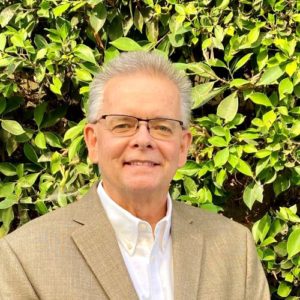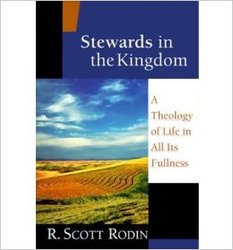Stewards in the Kingdom: A Theology of Life in All Its Fullness by R. Scott Rodin. InterVarsity Press, 2000, 222 pages; ISBN-10: 0-8308-1576-7; ISBN-13: 978-0830815760. $20 at Amazon.com
Reviewed by Kerry Schottelkorb
| A few years back I was invited to present a fund development seminar attended by several leaders of like-minded organizations. I began by asking the “Why have you come?” and “What are your hopes for our time together?” questions. The immediate and aggressive responses startled me. The majority of people said they needed new sources for funds. “Please give us some major donor names,” was the cry of the hour. |
Once I had gathered myself I replied, “This has got to be the ultimate in cutting to the chase!” Needless to say, what I had prepared did not come close to fulfilling expectations.
I can relate to the pressure those leaders felt that day. It is so easy and tempting to bypass the essentials in the name of our “good kingdom efforts.”
Having been asked to review R. Scott Rodin’s book, Stewards in the Kingdom, I must admit I found myself scanning the “Table of Contents,” seeking to cut to the application chase—to find some choice stewardship/fund development nuggets! Finally, I settled in for the whole ride when, almost immediately, Dr. Rodin proclaims that our addiction to the expedient, the utilitarian, to cutting to the chase for stewardship solutions that work (meaning they bring in much needed money to our ministries), has resulted in a loss of a clear theological definition and passion for genuine stewardship. He establishes at the outset that while “there have been countless books written which focus on the practice of stewardship producing resources for understanding what stewardship looks like, we have failed to raise up stewards.”
As a theologian with fifteen years of professional fund-raising experience, Dr. Rodin points out “the history of the church’s handling of issues regarding stewardship is laden with false starts” and so he moves us “from the who question of theology to the how question of Christians’ ethics and discipleship” while pointing out the resulting carnage wherever these questions are switched.
Dr. Rodin calls us to “return the concept of the godly steward to the daily vocabulary of Christian life and worship. The purpose of this book is to start us in this direction by providing us with a theology of the steward.” The second, “equally compelling reason for this study is that the Christian life is to stand out in the world marked by the attributes of peace, purpose, wholeness, fruitfulness and joy.” Dr. Rodin contends that “the loss of a theology of the steward has not only damaged our ministries, it has robbed us of the rich, full and fruitful life God intends for us.”
So, finally it dawned on me that this book is not first a study on Christian stewardship or fund development. “The thesis of this book is that by reclaiming the central motif of the steward, and building it on a sound theological and biblical base, we will be freed and empowered to live as joyous children in the kingdom of God…. That is the life for which Christ died. That is the life that will shine like a light city on a hill, drawing to it all who are lost. That is the life lived by stewards in the kingdom of the triune God of grace.”
Remember, Dr. Rodin said we must first address the who question of theology and only then may we move to the what or ethics question. Throughout the book, Dr. Rodin uses the phrase “stewards in the kingdom of the triune God of grace.” However, he tells us we must read this phrase backwards.
“We know we are called to be stewards, but we cannot begin at this call. By definition, a steward is under the command of one who owns the resources that are to be stewarded. Steward is a title of a servant, one hired to undertake this activity on behalf of the owner. Therefore, we must move the ethical questions back one step and ask, ‘Whose stewards are we? To whom do we owe allegiance in our work?’”
Dr. Rodin starts by offering “a Christo-centric epistemology—a Christ-centered way of knowing as the only possible starting point for Christian ethics.” He moves from there to an understanding of the triune God: Father, Son and Holy Spirit. This is crucial because “a thoroughly trinitarian doctrine of creation informs our self-understanding as creatures of a wholly relational God. Therefore, the call to be a steward is also a call that comes from the Father through the Son and in the Spirit.”
Every part of the relationship the triune God calls us into is grace related-even our repentance! However, we are reminded that our calling as children of God in Christ is to be caretakers of this precious gift, even though it is a gift of grace. We did not initiate the relationship, but we are called to steward it.
The fallen reality of the sinful steward is that every day we live out our “sordid solidarity with Adam” as we rebel against God, break with our neighbor, exploit the creation and sin against ourselves.
However, called by the Father through Jesus the Faithful Steward and led by his Spirit, we are invited into a life of worship. “Worship, defined as the free and joyous response to the grace of God toward us in Christ Jesus, is the center of the life of the steward.”
By definition, a theology of the steward means we are kingdom people. We are stewards in the kingdom of God. However, because his kingdom is “both now and not yet” we very easily fall back into positions of ownership, power and control. We hoard, consume, dominate and exploit.
In chapter 6, “The Myth of the Two Kingdoms,” Dr. Rodin addresses the insidious dynamic of a two kingdom mentality, resulting in a “distortion of our relationship to God, to our neighbor, to ourselves and to God’s creation. This latent sin permeates the church and threatens our witness as stewards in the kingdom of the triune God of grace.”
In chapter 7, “The One Kingdom of the Steward,” we rejoice in the wondrous fact that “our lives are not marked by the same boundaries as the world—a life-to-death understanding. We live in a transformed reality—our existence in God’s kingdom; our reality is not marked by birth behind us and death ahead of us, but as children of God our lives are marked by death behind us and only life ahead!” This reality is the key to our living freely, purposefully and fruitfully as God’s kingdom stewards.
Dr. Rodin powerfully states that the “call to be a steward in the kingdom of God is all about death. Before it is about giving, sharing and investing, it is about death. The fact that we do not hear much about death in the church’s teaching on stewardship may point us to why such teaching has been so ineffectual.”
Our death responses—renunciation of any area of our lives where we remain lords—are simply responses to what Jesus has already done for us. Once we have died in Christ we are free to live: “free from” the baggage of the world’s kingdom and “freedom for” service to God, true love of self, service to our neighbor and healthy stewarding of the creation. The godly steward is daily being called to engage and choose for “one-kingdom living” as God’s worshiper.
In the final two chapters, Dr. Rodin is ready to talk about stewardship. We conclude with a look at the role of the church and the family as the steward and training ground for the nurture and growth of stewards and then a final focus on the ministry of fundraising. For those of you who might be a lot like me, do not even try delving into those last two chapters first. They will not make any sense to you without the foundation of the first seven!
I came away from this book deeply humbled and shaken frankly. I feel the need to re-read and give more time to the profound truths and life application Dr. Rodin offers in the light of scripture. I also have great hope that we will take a much closer look at the foundational biblical truths and dynamics related to the steward in the kingdom.
In the dedication of his book, Dr. Rodin writes: “I pray that this book will be a blessing to pastors, lay leaders, Christian fund-raisers, parachurch ministry leaders and Christian schools, college and seminary faculty, students and leadership. You were in my thoughts and prayers as I wrote.”
It was obvious!
Image credit: Rice Paddy by Proggie, on Flickr

Kerry Schottelkorb
Rev. Kerry Schottelkorb is the president of ChinaSource. For twenty years Kerry was involved in local church planting and youth ministry, both in the US and Hong Kong. He was the founding pastor of the Cle Elum Alliance Church in Cle Elum, Washington and one of two founding pastors of Evangelical …View Full Bio
